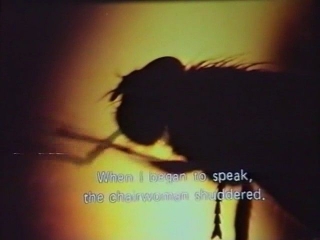Date: 30 October 2005 | Season: London Film Festival 2005 | Tags: London Film Festival
FILMS BY VLADIMIR TYULKIN
Sunday 30 October 2005, at 2pm
London National Film Theatre NFT3
Vladimir Tyulkin, About Love, Kazakhstan, 2005, 28 min
A portrait of Nina Perebeyeva, who for 30 years has dedicated her life to abandoned and infirm dogs, turning her home into Kazakhstan’s only animal shelter. Dogs are everywhere – constantly barking and bickering – and the house is one big litter tray, but there is such compassion in the chaos. Perebeyeva is almost saintly in her devotion to the animals, and the film’s tender view culminates in the absolute wonder of its life-affirming ending, in which she receives an unexpected gift from the film crew.
Vladimir Tyulkin, Lord of the Flies, Kazakhstan, 1990, 45 min
Lord of the Flies is an incredible glimpse into the life of Kirill Ignatyevich Schpak and his garden of unearthly delights. An outsider by any standards, Grandad Kirill has spent his retirement ‘undermining the fly population’ by killing flies with an almost religious fervour, hoping to prevent contamination by the bacteria they carry. Hard working and well intentioned, his method is inventive but slightly skew. It looks like he’s actually cultivating larvae in his ‘flytrone’ just so that he can destroy it, after which it’s preserved as feed for the chickens. ‘It gives me free meat and eggs. If such farms are set up all over the country, we’ll enter a new era of prosperity’. He admits his efforts are futile unless his pest control plan is implemented worldwide, and his self-sufficiency doesn’t entirely provide for his citizens: he buys canine corpses from the dogcatcher and boils up the meat – disguising the taste with stewed aubergines – to feed to his hounds. This self-styled tsar enforces strict law and order and has no time for perestroika; his backyard is a ‘state in miniature’ in which nations of animals live in communal harmony. Kirill addresses the camera with crazy schemes and proclamations, and the camera spins off into inspired observations of the world he has created. The visionary cinematography and autumnal colours make the film look like an apparition from Hieronymus Bosch, perfectly apt for this extreme, medieval lifestyle.
PROGRAMME NOTES
FILMS BY VLADIMIR TYULKIN
Sunday 30 October 2005, at 2pm
London National Film Theatre NFT3
ABOUT LOVE
Vladimir Tyulkin, Kazakhstan, 2005, video, colour, sound, 28 min
A portrait of Nina Perebeyeva, who for 30 years has dedicated her life to abandoned and infirm dogs, turning her home into Kazakhstan’s first and only animal shelter. Dogs are everywhere – constantly barking and bickering – and the house is one big litter tray, but there is such compassion in the chaos. Perebeyeva graduated from the conservatoire, but her piano has long been abandoned. She now sings in the church choir and is almost saintly in her devotion to the animals, taking care of between 50 to 120 dogs on a small salary of 40 dollars. This tender film culminates in the absolute wonder of its life-affirming ending, in which she receives an unexpected gift from the film crew. (Mark Webber)
LORD OF THE FLIES
Vladimir Tyulkin, Kazakhstan, 1990, 35mm, colour, sound, 45 min
Vladimir Tyulkin’s 42-minute epic documentary Lord of the Flies introduced Kirill Ignatjewich Spack, a wild-haired post-Soviet farm hermit who’d developed a complete self-sustaining animal ecosystem involving the farming of flies to produce maggot-feed for his animals, who one by one became the meat traps to lure in the flies. A Russian tyrant in miniature – the Stalin of his bestial gulag – he talked Tyulkin calmly through his mad methods and morals, and commended his system to Mikhail Gorbachev for national rollout. This animal kingdom seemed to have regressed to the Hobbesian idea of the state of nature: nasty, brutish and short. (Nick Bradshaw)
Lord of the Flies belongs to the literary tradition of Jules Vernes’ tale ‘Two Years Holidays’, in which he describes schoolboys who bring into being a rationality-based, ideal world after being stranded from a shipwreck. William Golding’s story, ‘Lord of the Flies’ from 1954 takes up the motif of the stranded children, but sketches far more realistically, the development of despotism in miniature format. The figure of the fly killer in Tyulkin’s film possesses many aspects: as the post-communist version of the hippie dropout, he symbolises the improvised gardening at a datscha, a way in which many Soviet citizens ensured their survival after perestroika at a primitive level. He sways back and forth between the caricature of new entrepreneurship – after all, he has managed to construct an own economic circulation on his land – and the incarnation of the last Stalinists, who are still obsessed with ridding the world of their enemies. Flies have, furthermore, a long tradition in Soviet iconography: their larvae in canteen meat are the trigger of the revolution in Battleship Potemkin, symbolic of the rotten system of the Czar, a metaphor for the later, no less degenerated Soviet system, described in the works of Ilya Kabakov. At the same time flies have always been seen as a worthless life form because of the sheer masses in which they appear and because of their short lifespan, which refers to the Gulag in its purposeful annihilation, but also refers to their ideal disposition as material for scientific experiments, just as the Soviet person in the socialist experiment. The film achieves a particular topicality not only due to the war in Chechnya with its undisguised purge terminology, but also of genetic technology, which began with flies and is now being advanced to human beings. (Craig Venter is, since his decoding of the Drosophila Genome also termed “the Lord of the Flies”.) And, it is actually so, that the notion of the New Human Being is enjoying its resurrection through genetic technology. (Marcel Schwierin)
Back to top
